#there’s also the argument of wealth and class here
Text
still rotating him in my mind like a kebab. But racetrack’s wardrobe is so everything to me. Once again may routh please let me interview you for an in-depth analysis on costume design for every newsies clothing (yes even swifty’s vest which is Atrocious. It’s So Bad.) Racetrack’s undershirt being two sizes too big for him is so important to me and his gaudy vests that he has to hitch up to his pants? There’s so much bravado that begins and ends with how he presents himself as larger than life in favor of the odds he’s presented through shape. Even the parts we can’t see (ie his suspenders, pocketwatch) are properly coordinated to his outfits which implies he takes care to notice for little details that are incessant to other characters clothing.
#racetrack higgins#i love his stupid bow tie he doesn’t even tie on correctly#the only thing I’d complain is we should’ve gotten to see him with less wax in his hair#even though that’s also a main part of his character#which I could go into just that for hours#i won’t. but I could!#he’s a spiffy little guy#there’s also the argument of wealth and class here#which I Could Also Talk About for hours#that however intersects into more serious aspects of interacting with the media#one that I am not equipped for nor have the proper language to divulge#anyways. back to rotating him in my head.
45 notes
·
View notes
Text
Stupid bunny ch 1? 2 3
Coriolanus Snow x reader
Word count: 1.8k



Y/n Ashwood was the daughter of a very powerful family that was a part of the structure of the Capito, the Ashwoods had been one of the few honorable families to survive the falls of the most powerful families. Y/N was a very sweet innocent girl who never had to survive by eating raw meat or scraps and didn't have to fight for a scholarship to attend the Academy.
Alongside her wealth she was a beautiful girl with long lashes, rosy cheeks Doe eyes, and plum lips, her hair was in bubble braids or in long curls her hair was silky smooth by the touch of it and her looks were ones of a saint, y/n was looked at as a white soft rabbit or a doll to some as her life seemed to be in the hands of her family.
As Y/n attended the academy it was inevitable she was popular she had the looks and the Brain which amazed her peers how can a girl who looks like a saint and fragile to touch look at such hordes of sights? Y/n had known of the Snow family as they were one of a higher class but close to the bottom she knew exactly of Coriolanus Snow his long curly locks and his charming looks.
There was also one more reason Y/n Ashwood knew of Coriolanus Snow she had been his fiance since the moment they were both been born the Ashwoods and The snows had set the engagement in motion when y/n was 7 years old she met snow on one occasion and it was breath taking she still remembers it the way he had walked toward her as she hid behind her mother he took her hand and kissed it introducing himself.

*Present day*
As our days with our distracts pass soon to the games I notice how Coriolanus looks at his distract trains Lucy grey I’ve seen her girl from distract 12 I see the way she build skinny pretty from her distracts condition but to me there’s no hope a performer in an hunt I say shell die in the first 10 minutes but the way I catch his eyes longing at hers every moment at her*
My trainee was a boy named Reaper his build was strong and what I’ve read he had even attacked a peacekeeper which betters the odds.
“Coriolanus!” *I say as i see him alone for once passing by as I say his name he turns his head as his eyes lock to mine* “y/n?” *I walk closer* “I’ve missed you it’s been so long it just seems your time has been consumed so much into the game you know my family’s gonna. Host another dinner party you should come!” *I say smiling brightly* “I don’t think so I-i have to see how to better Lucy’s chances” *I look at him and my nose crutches from his response* “you mean your tribute right?” *I say harshly* “Yes, is their something the matter y/n?” *he responds more in colder tone* “it’s-s just seems like your mind is more on the girl then the goal of winning I mean she’s not the strongest tribute and doesn’t seem that smart” *I say as my words drop with venom getting so hung up on my words I don’t notice his expression to get more pissed* “Y/n! I have to spend my time on her, okay? I don’t have the riches to pay for the academy I need to be on this scholarship you can’t even view my point as your life is handed to you” *he says coldly making me shiver and I realize where I went wrong* “Coriolanus wait-t I didn’t, I wasn’t trying to make it seem that way!” *I say as my face blush’s from the embarrassment and I try to resolve this small argument* “y/n just shut it I have to get back to Lucy” *I feel this utter poison in me as I grab onto his shirt as he begins to walk away* “STOP! Don’t leave me!” *i say as a demand he quickly turns and looks at me but his eyes cold his look disturbed with my existence* “you’re just a stupid bunny” *he says as his words feel like a ridicule*

I’m end it here cause I started to hate it 🥲 if you have any suggestions or anything just tell me plz
237 notes
·
View notes
Text
I would like to refer to a “discussion” I saw on Twitter regarding casting of di Angelo family in show. I saw people with evident lack of some sort of knowledge about geo-history demanding di Angelo family to be black, asian, latino (this one is crazy considering the fact that people born in latam usually use this only for people born in latam but ok).
Here’s my point. If someone sides with the argument that for some characters (for example Mulan, Merida, Tiana, Elsa, Pocahontas, Mowgli), their ethnicity is important for their history and background, but at the same time rejects the canon facts that Maria di Angelo comes from a family of diplomats, rises her kids in Venice during Mussolini regime and is able to leave Italy during ww2 (considering that, the family is most probably from upper-class or higher-middle one), then they are just a hypocrite who look at everything from american-centric point of view and is not really thinking clear.
Nico is canonically italian (with olive-toned skin which is common for that region of Europe). Hazel describes him as a white boy. It’s literally first or one of firsts impressions that she has of him, how physically different they are. Summing up, historical context of his family’s journey makes him a white italian born on north side of the country and that is also an important factor here if you know how wealth is different in every region of Italy. And it’s all as much important to his character’s background as it’s important for other characters such as Hazel, Leo, Reyna and Frank that they have a canon ethnic/social background and it’s not something that should be easily erased. That’s why the “Rick doesn’t care about the book version of characters during casting” won’t ever speak to me when it comes to some of characters. For example the ones I listed.
That’s my opinion, and I wanted to express it, because I see a certain amount of hypocrisy and cherry-picking arguments in this discussion about representation and live-action casting.
11 notes
·
View notes
Text
I've got a long meta in my drafts no one will like about Literati class issues and why Rory is inclined to think the worst of Jess when she's actually dating him, but I'm just going to get to the point. Rory was immensely privileged to be raised by a teenage mom invested in her welfare who worked herself up to middle-class life, as well as wealthy grandparents who were there to provide the things that Lorelai could not give her by herself. Jess did not grow up with those advantages. Stars Hollow judges him harshly for being a troublemaker and not being the socially compliant middle class kid who is satisfied with social life in that tiny town, but all of that is heavily influenced by class snobbery.
He's a working class kid from the big city who grew up poor and is being haphazardly raised by his uncle who is also working class. Jess doesn't live by their social standards: he skips class, causes trouble around town, would rather work than go to school, has sex with his casual girlfriend, and wants to get away as soon as possible. They judge him for not viewing their way of life as superior to his and Rory judges him for that, too. She's physically and intellectually attracted to him and has lost interest in Dean, but she's not willing to give up the advantages she has of being the socially compliant "good girl" and doesn't do so willingly until Dean jumps ship. Even then, half the time she is either ashamed of him, inclined to think the worst of him, and views his responsibilities as inferior to her social life and almost dumps him when he doesn't plan adequately for dates. She did view him (at least subconsciously) as inferior to her because of where he came from and for his lack of ambition but most of all because he did not want that middle-class life, either. He didn't like Stars Hollow and Stars Hollow didn't like him. He didn't want that life for himself. Luke may have failed at easing his transition into the next phase of his life, but he did need to leave there and figure out where he needed to be on his own.
There's more one can say about Rory's selfishness in season 4, when she rejects Jess in the hopes of clinging to Dean and getting that small town middle class status back and believing Lindsey is a minor inconvenience to be disposed of, only to use her upper-class advantages to run away from the situation and rejecting Dean for that life once she's actually free to date him again. That's not the point here: the point is that Jess deserved a life where he could be accepted and loved and respected without having his class status weaponized against him, and he could only find that life if he wanted to be there and wouldn't resort to his troublemaking antics out of boredom. He could not have that life in Stars Hollow, and Rory was part of the reason why. Eventually he needed to be free of her judgment, too.
Could these two work it out in a hypothetical future where these issues don't trip it up? Maybe. Jess comes to Rory's rescue twice after he's grown up and found a home for herself and she's still spiraling because upper-class life hasn't satisfied her, either. However, she ultimately rejects Jess again for life with Logan and she hasn't quite escaped the appeal of it a decade later, even though she isn't willing to commit to it full time by actually marrying (or by the AYITL era, even dating) him. She also weaponized Logan's wealth against him in arguments more than once in the OS, too, so this is a tactic she resorts to when she's unhappy. In AYITL, all three guys have settled into lives they're more or less content with and Rory still doesn't know what the fuck she wants. Same old story, I guess. She no longer judges Jess, so maybe there is hope.
10 notes
·
View notes
Note
Well, hello!
First of all, I would like to tell you that your publications are very interesting, fun and inspiring, I really like the concepts and AU's that you share here.
So, my question is, how different are Vox's..."feelings" or thoughts towards Alastor between "The Devil's Bastard AU" and "Raised Together AU"?, since clearly in one case he later finds out Alastor is Lucifer's son, while in the other he knows it from the beginning, so there are probably differences with the canon.
I mean, from what I've seen here, I think you mentioned that Vox is still obsessed with him, but if you could elaborate a little more on the scope of those complicated feelings I would really appreciate it.
By the way, have a nice day :)
I actually had to go back and reread some of my old posts, because I needed a little refresher on everything I'd already written about Alastor and Vox. For the main Devil's Bastard AU, I would say that Vox's feelings upon learning about Alastor's secret are a mix of shock, fury, and horror. It doesn't really occur to him that Alastor himself didn't know that Lucifer was his father. Vox's first thought is that of course Alastor knew, he just kept it a secret so he could build himself up as a self-made man while secretly being a nepotism Overlord and a hypocrite.
It's one of those things he and Alastor often fought about, right before their friendship dissolved. Alastor coming from a poorer background and being a member of multiple marginalized communities during the days of Jim Crow laws, while Vox was a white, presumably wealthy cult leader who preyed on the disenfranchised, they had wildly different views on things such as class and wealth inequality. So when it comes out that Alastor is Lucifer's son, Vox comes to believe that Alastor was talking out of his ass during every one of those arguments.
At the same time, Vox is seething over the missed opportunity to have someone with Morningstar blood on his side. The royal family isn't well respected (except maybe Lilith, but it's hard to say definitively) but they are undoubtedly powerful. That's why the Vees were so nervous about Alastor making a deal with Charlie. Vox tells himself that if he had known, he would have fought harder to get Alastor either as a business partner or on the end of his chain.
He's right. In the Raised Together AU where Vox knew from the get go who Alastor was, Vox approached him with that knowledge in mind. His friendship with Alastor had a less organic beginning, as he had ulterior motives towards Alastor. However, I do think that he did develop real feelings for Alastor over time. Not necessarily healthy ones, mind you, but real nonetheless. I'm fond of the interpretation that Alastor was Vox's bi awakening and that the two of them had a genuine friendship before whatever incident lead to them becoming bitter rivals. There's also the implication that Alastor may have played a part in Vox's rise to overlord status.
Now, Alastor isn't stupid. He's aware that many of the demons who approach him are looking to improve their social standing. He was less open to Vox in the beginning, but Vox's charisma and honed people-skills did eventually get him into Alastor's good graces, and as Vox's feelings developed, Alastor's walls came down to the point that he willing to call Vox a true friend.
However, Vox didn't let his emotions get in the way of his ambition. If anything, he only became more determined to tie Alastor to him. He started trying to drive a wedge between Alastor and Charlie, encouraging Alastor's worse habits and more ruthless side. He tried appealing to Alastor's ego by saying how the two of them were above the common Sinners and with their powers combined they could control the entire Ring of Pride and blah blah blah. He proposed his alliance and, well...
Like I said. Alastor isn't stupid. He'd been fully aware that Vox had been trying to manipulate him for some time by then, but he valued their friendship enough to try to maintain it and arrogant enough to think he could do this while evading Vox's manipulation attempts. And, well, it wasn't like he didn't also use Vox, to an extent. Bridging the gap between himself and the Overlords, getting an in to their meetings and a direct line to some of the technological and social advances taking place in Hell. As long as it was reciprocal, it was fine. But when he turned down Vox's proposal, Vox exploded.
It didn't turn into full on physical fight, not because they weren't willing to hurt each other, but because Vox had enough self-control to remind himself that attacking Lucifer's son might not be the best idea. But their friendship did end messily in that moment, even without the bloodshed. Afterwards, Vox had to tread carefully around Alastor so although their rivalry still exists, it's not quite as public. What he didn't know was that Alastor actually prevented Lucifer from doing anything to Vox after their falling out. Later when asked, Alastor will say that Vox had only ever used him and never actually cared for Alastor, but he won't speak a word on his own feelings about what happened.
#ask#anonymous#thank you for the sweet message!#I'm so sorry I sat on this for so long#hopefully you still see this#and I hope you have a good day as well!#Hazbin Hotel#the Devil's Bastard AU#Raised Together AU#Alastor#Vox#RadioSilence
9 notes
·
View notes
Note
How do you know youre upper middle class? Isn't class related to race so like only white people are truly considered to be middle class to upper class. Intersectionality or whateva. We can be billionaires but since were POC we will never be seen as one of them because of our bloodline/descent/color etc
That's not really how that works. While someone who is white (or, of the most privileged race of the culture) has more social power than someone of colour who makes the same income, they still make enough money that they count as that class.
Intergenerational wealth also counts for something, which is why there are eg more white rich people than rich poc in the west.
Class relates to race in that different factors of oppression or privilege affect individuals differently, but class terminology is a useful tool for understanding how social power relates to wealth.
For example, I, a mixed race black person living in canada, absolutely have more power than a poor white person in certain situations. Other upper middle class people subconsciously recognise me as being of the same class, because of the way I dress (I have cool glasses, I wear gold jewelery with precious (semi-precious?) gems, the way I speak (which I would describe as "upper middle class canadian academic English"), and more. That class connection of "ah yes, we are both upper middle class and therefore are similar", that in-group affiliation, benefits me in many situations. It also doesn't benefit me...enough, I guess? in many situations.
I'm thinking now of the "cowboy church" incident. I won't get into the whole details, but this story includes me, my brother (mixed black), my friend (black), my dad (black), and my dad's girlfriend (white) walking into a small rural Texan church full of only white people. EVERYONE turned and stared. It was honestly so unnerving. You ever see the look in someone's eyes and just KNOW they're thinking the n word? It was like that.
In that case, people saw my skin colour. These were not upper middle class city folk, there was no group affiliation except for assumed Christianity. They did not see my outfit, and the way I spoke and carried myself. They saw my skin colour.
But could you imagine how horribly that would have gone had we appeared to be low income? If we walked in with idk sweat pants and a hoodie and no jewelery and speaking in AAVE? We would have absolutely been received in a much harsher way. So while there was not the benefit of in-group affiliation, my class still benefitted me because they saw my class as "neutral" kind of, rather than "poor person".
You're totally correct in that there will always be the dynamics of racism within same group class dynamics, that never goes away.
As for how I know I'm actually upper middle class, if that was a real question and not just a lead up for your ask that really meant "but are you really upper middle class if you aren't white?" Well, I haven't looked at class income demographics in canada recently, but I just kinda... know?
Guessing based on parental income (I have no income)(also yes that complicates class! I'm applying for welfare despite being upper middle class.)
Not the first generation to attend university
My parents and grandparents paid for my entire undergrad (to be fair, keep in mind I'm canadian, it was like $2000 a semester. We aren't talking american uni costs.)
We live in a house we own that has 3 floors, a front yard, a backyard, and a pool
I travel every year at least to other parts of Canada
My various family members and I have all been on international trips
I say things like "one must question the validity of their own argument" or whatever. Like, I use the pronoun "one". I also use more words of French and latin origin in everyday speech, like "ameliorate" or.. idk, other ones, it's like midnight here.
Almost all of my clothes I buy new, thrift shopping is a fun activity for me and not a necessity
My glasses are designed in France and the frames alone cost $300
Idk, I just know man. Insert Japanese shrug emoji here.
I hope this makes sense, it's late here and my brain has been a little funky today, so feel free to ask for clarification if needed
6 notes
·
View notes
Text
Jane/Maura tension in Jane waiting for Maura to give up on her...
I'm literally writing this post because I had a dream last night of scrolling tumblr and reading Jane Rizzoli character analysis from an episode that doesn't exist. So, in terms of real character analysis... have this.
I've made a little post about my absolute favourite ship dynamic and I really want to situate Jane within it. To me, Jane is a character that has some major commitment issues (that are also somehow abandonment issues) and this fear that people will give up on her, but especially Maura. At one point in the early seasons, Jane and Maura have a conversation that reveals Jane doesn't like to be disappointed.


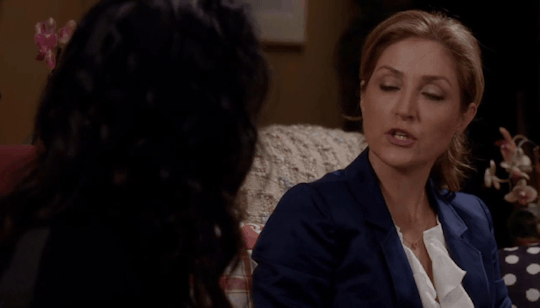
And I truly think this is a key aspect of her early characterization. She hates being disappointed and yet it seems like part of her constantly expects to be. If she has something good, she doesn't get to keep it right? And this thinking extends significantly into her early interactions with Maura. I'm going for the first three seasons here, because it's what I have notes on, but it honestly probably extends past that. So here's Jane terrified of Maura giving up on her as a key element of her narrative conflict with Maura.
I'll start at the very beginning. The pilot features the first little kernel of this fear when Jane shows up at Maura's after Hoyt escapes. Gabriel Dean shows up at Maura's door and Jane's insecurity flares because they seem to both like him, but instead of pure jealousy in a romantic sense...
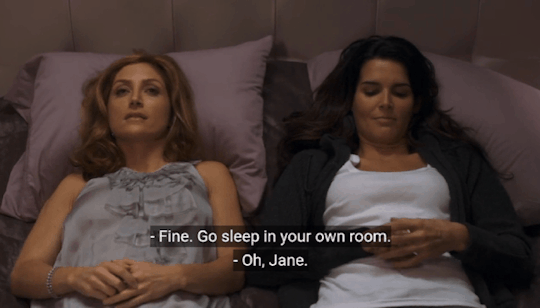
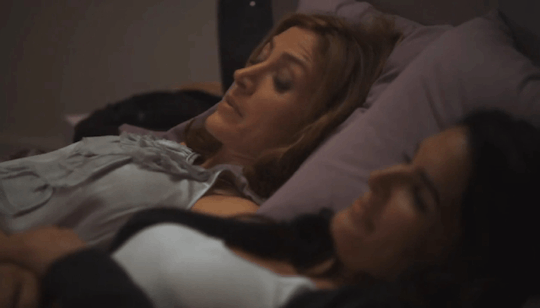
There's also a sense that Maura will inevitably get him, not her. And very little trust in the ability of their friendship to survive them both liking the same man. Jane argues with Maura about her secrecy in this episode out of this fear when she has to go to Quantico, but she's sympathetic here because we can see how much insecurity and fear undercuts her actions. She expects Maura to give up on her with the choice of Dean and Dean on her with the choice of Maura.
This seems like a central current of the first half of season one, especially with the thread laid down in 1x04 pulled into 1x05 with Garrett Fairfield. Jane is framed as insecure about her station. When there's a murder at BCU, it brings up a lot about Jane's limited post-secondary education. She tells Maura about how the BCU campus inspires her, but also makes her potentially regretful.

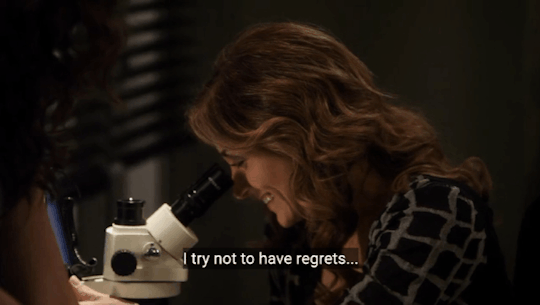
This becomes even more central when Jane sees Maura with the Brahmins and class comes even further into play. At the scene, Jane wants to question the Fairfields, but Maura is resistant.

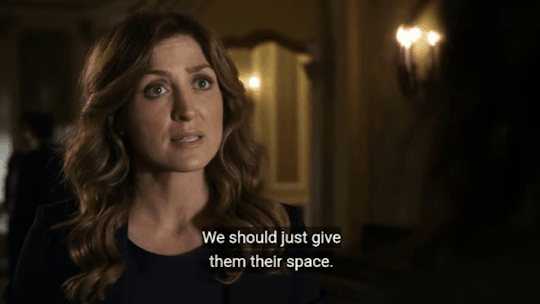
Look at Jane's face. She looks like she's just been horribly betrayed. And it culminates into this argument at autopsy.
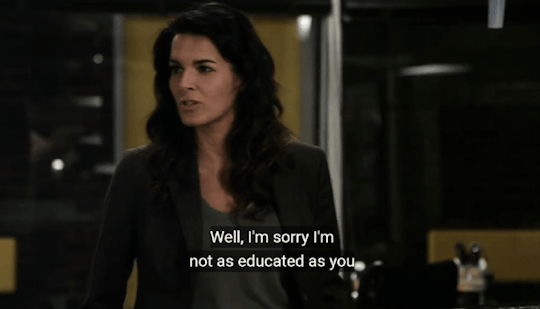
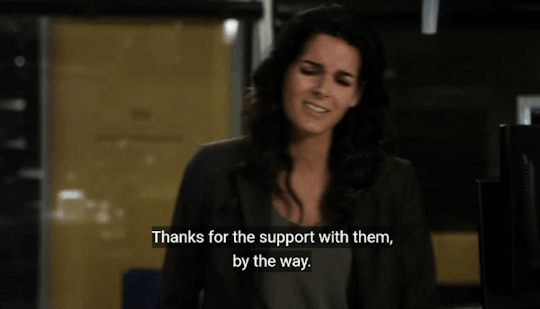
This compounds on that insecurity about not having a college education by pairing it up with wealth and social power. These things all become a wedge between Jane and Maura because, like Korsak suggests, Jane is afraid that Maura's allegiance is to those ideals rather than to her.
This fear of Maura giving up on her clearly extends beyond wealth and education because it also comes into Jane's interactions with Maura around Tommy. Jane essentially begs Maura not to sleep with her brother, whose mind Maura finds attractive, and then says Tommy's not the only Rizzoli "with a beautiful mind." So perhaps there's an element of romantic jealousy more clearly oriented towards Maura creeping in. But when they have friction over Tommy's arrest, these fears are once again aparent. When Maura doesn't risk a prison sentence and the loss of her medical licence (you know, things you would definitely risk for just a friend) to warn Jane about Tommy's arrest, Jane goes off about how Maura didn't trust her to protect her. And how she should've protected Jane too.
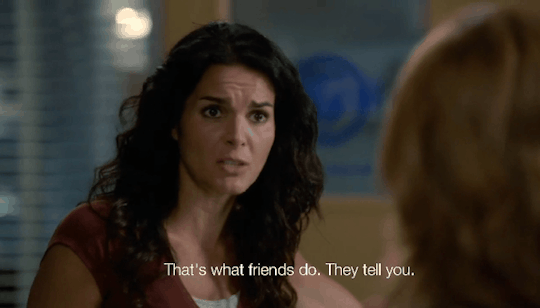

She almost insinuates that they're not friends or that their friendship is tenuous because Maura won't devote herself entirely to Jane's loyalty no matter the personal cost simply because Jane already has invested loyalty into Maura. The reciprocity's unequal, though, which becomes clear when Jane shoots Paddy. At first, it's just fear that her friend will be mad at her because she shot her father.

See the insecurity in it? The humanity, the clarity she was emotionally connected to Maura despite having just hurt her? It turns.



Jane rushes to Maura because she's afraid Maura will turn her over to the IAD and tells her that if their friendship ever mattered, she would be careful about her words. She is so afraid of Maura giving up on her, and so sure she'll do it, that she doesn't even see her own irony here. She wanted Maura to trust her to protect her. But even she can't trust people that way.
When you put all these moments together, you can understand that a lot of Jane's early seasons moments of anger were actually just insecurity and fear turned outwards. And another thing is that, most of the time, Maura acts kindly and reassuringly in response. Or is at least willing to apologize for her responding anger. Other than with the Paddy experience, which took a while, Maura has reasserted her allegiance to Jane almost immediately, found ways to make up for hurting her. Like...

This fear of Jane's definitely isn't limited to the above examples. Consider:
Ian Faulkner and how Jane treated Maura when he was around
The facial expression and apology Jane gives Maura when her father causes a scene in her home
The bridge jump and the scene afterward in which Jane calls herself "hard to love"
I really feel like the disappearance of this fear is a major part of what makes Jane feel so different in those weird last seasons. She's afraid of losing Maura to violence, sure, but I think this fear of not being good enough to keep her vanishes. And maybe there's sense to be made of it. Maybe Maura has, in some way, proven herself not to be the kind of person who would discard someone else. Maybe Jane has finally put her through enough trials. But that kernel of insecurity driving her early angry moments with Maura is what humanizes her instead of making her out to be cruel. As the show goes on, she feels more and more cruel. At least to me. And I think this is partially why.
P.S. Maura has this fear too, which is what allowed it to feel balanced in the beginning.
#rizzoli and isles#jane rizzoli#rizzles#character study#again because i love it#if you see a mistake in this post no you didn't#this part of Jane reminds me SO much of Tasha Zapata of Blindspot
81 notes
·
View notes
Text
The wage earner sells his labor power in exchange for a fixed wage which depends on the services provided: these services are also fixed, defined in amount (hours of work) and in type (qualification). The equivalents are determined according to a fixed scale (that is, by a price determined by the total supply and demand on the labor market in the capitalist system) — a scale which is not subject to the good will of the parties concerned. The individual employer and employee do not influence the terms of the contract, and the individuals are interchangeable. The labor which is furnished has a universal value, and it is this value which the employer buys, and which the wage earner turns into money, because he can take his labor power elsewhere. The fact that it is precise services which are bought means that the wage earner can increase his earnings by improving his services, either in amount or type.
The services which a married woman provides, on the contrary, are not fixed: they depend on the will of the employer, the husband. Nor are these services remunerated according to a fixed scale: the support furnished does not depend on the work done by the wife, but on the wealth and good will of her husband. For the same work (for example, the rearing of three children) the support received by the wife of a worker and the wife of a business executive can vary by as much as tenfold. Conversely, for the same support the wife furnishes very different services depending on the needs of her husband. Thus the housework of the wives of upper-class men is reduced in favor of social display and conspicuous consumption. Since the benefits received bear no relationship to the services provided, women do not have the option of improving their services in order to increase their standard of living. The only solution for them is to provide the same services to a richer man: the logical consequence of the nonvalue of their work is the competition for a good marriage.
The Main Enemy, Christine Delphy, 1977
Just read this short essay (you can find it here) and while I have a lot of critiques I would highly recommend reading it, it brings a new and deep analysis of patriarchy. She argues that the household forms its own sphere of production separate from industrial capitalism, and that it is organized more like feudalism or slavery - on the basis of the heterosexual contract, women do the work asked of them by the men, and their compensation for it in return is not the value of the labour, or proportionate to their time, but simply whatever their husband sees fit to give them.
I think she somewhat fails in theorizing how the class position of women within the household changes their class position in capitalism (the bourgeois wife does in fact have a material stake in the bourgeoisie being the ruling class, her takes on slavery are as bad as you'd expect for a white 70s feminist) and her analysis is limited to "wives" which are of course only one type of women, but these are productive problems & don't fundamentally undermine her argument imo.
More quotes from the essay under the cut:
In France today women's work may be unpaid not only when it is applied to products for domestic use, but also when it is applied to goods for the market. This is true in all the sectors where the unit of production is the family (in contrast to the workshop or the factory), i.e., in most agriculture, in small businesses, and in craft workshops. Women's work is by no means marginal: in 1968 farmers' wives devoted on an average four hours a day to agricultural work.
The wife's unpaid labor thus counts in the general economy of the farm, as well as the unpaid labor of younger brothers and sisters, who are literally disinherited, and that of children. Although today in the majority of cases younger siblings and children threaten to leave, or actually do leave, unless they are paid a wage, it is important to remember that their exploitation was the rule in all sectors of the economy until industrialization (the end of the eighteenth century), and until the Second World War in agriculture.
The example of self-consumption on the farm illustrates clearly the fact that there is no difference in nature between the activities called "productive" (like fattening a pig) and household activities called "nonproductive" (like cooking the said pig).
What this bourgeois economist does not mention is that if most "households" prefer to buy food in a raw form it is because household labor is unpaid and because this labor is entirely provided by wives. One can oppose these facts to the ideology which says that the husband's wage alone pays for the total consumption of the household, while the housewife "does not earn her living."
Until 1965 the whole labor power of the wife was appropriated: her husband could prevent her working outside the home. These arrangements having been abrogated in 1965, it can be said that since then women have legally recovered a part of their labor power. Legally free to work outside of the home, a woman is not in fact free to do so. A part of her labor power remains appropriated, since "she must fulfill her family responsibilities," that is, provide housework and child rearing without pay. Not only does outside work not free her from housework, but also it must not interfere with it either.
It can no longer be maintained that domestic work is performed in exchange for support and that this support is the equivalent of a wage, and that this work is therefore paid. Women who go out to work support themselves and thus provide this domestic work for nothing.
Moreover, when the wage of a woman who works "outside" is calculated by the couple, the expenses of child care, extra taxes, etc., are deducted from her wage alone, instead of being paid from the couple's income as a whole.
The existence of two modes of production in our society is established: (1) most goods are produced in the industrial mode; (2) domestic services, child rearing, and a certain number of goods are produced in the family mode. The first mode of production gives rise to capitalist exploitation. The second gives rise to familial, or more precisely, patriarchal exploitation.
Thus her standard of living does not depend on her class relationship to the proletariat, but on her serf relations of production to her husband. In the vast majority of cases the wives of bourgeois men whose marriage ends must earn their own living as wage workers. They then become concretely the proletarians that they to all intents and purposes were — with the added handicap of age and / or the lack of professional training. Divorce reveals women's virtual and real class position in the capitalist system
7 notes
·
View notes
Text
i think both jean and emma are invested in their own privacy to some extent and they both provide certain illusions of access or openness to aid in that. or not illusions per se but. diversions maybe. the openness is a real part of them, jean is nice and emma is condescending right, it just kind disguises that there's more going on with both of them. i also think they both reach for a certain degree of theatricality? in different ways. jean is more prone to like, playing at acting i think, more prone to reach for the fantastical as theatrical, where emma's theatrical routines are much more about her playing on ideas of wealth and femininity and snobbishness. yk. i'm not actually making these arguments from canon i'm just talking but w jean i'm thinking specifically of her in x-men first class and x-factor here. and w emma i'm thinking of her little demanding routines she does w scott especially.
18 notes
·
View notes
Text
Big Celestia/Chihiro/Celeshiro headcanon post:
Wanted to compile a bunch of my headcanons here:
Celeste:
Starts off cold towards the class as in canon, but warms up to them. Becomes fiercly protective of them since they'rw her only friends
If she catches people bullying Toko, Chihiro, Taka, Hifumi, Makoto, etc she will retaliate
Is trying to come off super cool but is actually incredibly awkward. Most of the class still think she is cool after bedriending her
Extremely eager to show off her knowledge about her interests. Will just infodump on whoever is willing to listen.
Cries a lot in secret
Very insecure about her body and appearance
Also insecure about her interests that aren't gambling and European culture. Only Chihiro, Hifumi, Makoto, and Kyoko know she's into things like manga and video games. The rest suspect she's secretly a nerd.
Speaking of also prone to gamer rage and she's very thankful the dorms are sound proof
Secretly a My Little Pony fan. Only Chihiro knows because they made a joke while they were hanging out once about her name and noticed her panic. She took her first name from Princess Celestia. Also why she calls the others darling after befriending them.
If Byakuya's not around she'll be one of the first to offer to pay. She is bad at showing how much she values the others so she compensates with paying for meals or tickets to places
Basically kind of a bitchy Rarity once she has gotten over herself and connected with everyone.
Sews her own clothes, and eventually starts making clothes for the others with a discount on comissions
Gets roped into the obligatory D&D episode by Hifumi
Comes from a family that lived in poverty, got bullied as a kid as a result
Part of the bullying was being called a loser over and over again
Why she ends up being one of the first to stick up for the others
Has learned some self-defense to protect herself since she spends a lot of time illegally gambling
While she does drop more and more of her persona as time goes on, and is more authentic with everyone she still prefers the Celestia name and fancy clothing. They help her feel comfortable in her own skin.
She's only really comfortable using Taeko with the rest of Class 78, and even then not when they're out in public
Absolutely unable to cook well
Will start arguments with Byakuya, Leon, and/or Mondo for the fun of it.
Her and Makoto kinda confide in each other about how they feel like fakes next to everyone else.
She has read every single one of Toko"s books multiple times.
Ocassionally she will correct Hifumi when he gets something wrong about an anime and whistle innocently when people are stunned she knew that.
Makes the time to go to events the others are doing like Sayaka's concerts or Hina's swim meets.
Once she went with Hifumi to help sell his doujins. Ended up with Hifumi punching a guy in the face for creeping on her.
Sakura and Mondo also worry about her going to seedy parts of town to gamble and have discreetly followed her to make sure she's safe
She enjoys challenging Kyoko to various cars games
She also ends up enjoying discussing history with Taka
While at first she really hated Yasuhiro she did end up finding he could have surprisingly good advice from time to time.
Chihiro:
Trans girl. I accept any hcs on their gender. For me personally I just see them as a trans girl who compensated by trying to fit into a mold of manliness before realizing and accepting her identity.
She still likes to work out and try to get stronger.
Into making mods for video games
Has been into just about every embarassing fandom at one point or another. Superwholock, Homestuck, Undeetale, MLP, Steven Universe. She was overjoyed when she found out Celeste was too.
She will also haplily offer to pay for the others when Byakuya's not around. Her programming skills have made her a good amount of money, placing her just behind Celeste's wealth and 3rd highest overall
Also can not cook at all
Has a terrible sleep schedule, will need coffee as soon as she wakes up
While she identifies she/her she still doesn't have many feminine typical interests beyond the clothing.
Bottles up frustrations and anger, lets it out online in arguments.
Genuinely admires all of her classmates
Besides Makoto she is the most popular person in her class
Cries a lot too, but openly
She has written a program for each classmate that helps with their talent in some way
Celeshiro:
They kept it a secret for a long time
While keeping it a secret everyone thought they were just crushing on each other and kept trying to get them together
They kept playing it off pretending not to get it
Kyoko knew from the start
When they finally let the others know it was after they had an argument that was their first big argument.
They like spending a lot of time together in their dorms watching movies/tv, playing games together, being affectionate, and talking a lot
Because they both have a lot of hang ups they end up comforting one another a lot.
Said this before but Celeste ended up trauma dumping on the first date.
Celeste also had a panic attack prior to the date
In general even though it seems like Celeste is the cool mature one, Chihiro is the one that's more mature
Chihiro is drawn to Celeste because she thinks she is cool, that she is protective, and admires her willpower
Celeste is drawn to Chihiro because she loves her optimisim and friendliness. That she is not judgmental, and is always willing to listen to her ramblings
After they reveal their relationship they get a lot more affectionate in public
Chihiro also basically moves into Celeste's room.
Because Celeste forgets to lock her door a lot, they have been walked in on by every single one of their classmates at least once
They get married pretty quickly after graduating
While they don't really want to have kids the old fashioned way, they do get very adoption happy and they tend to spoil the kids. They might even run a foster home
Among them is Kokichi who Celeste likes to playfully have compete against Kyoko's protege Shuichi
Kyoko nor Chihiro even realize there's supposed to be a rivalry going on
Chihiro and Celeste are very cuddly. They find it difficult to get to sleep without touching the other in some way
Celeste makes Chihiro clothes for free
Because neither of them can cook they order take out a lot.
8 notes
·
View notes
Note
Hmm I was watching this video https://youtu.be/DHF8LdiFhW8?si=U3QcuoufihSLEONt
And in the comments they pointed out that parents of the 50’s were children on the Great Depression. Which got me thinking
As you know a lot of people who came from poverty goes crazy when they get famous or successful. The…black community is like that as we can barely comprehend so much wealth at once. Not all as many are slick enough to start their own record labels, clothing, etc.
But that comment got me thinking about the great generation. I can only imagine how crazy they went with the fact they grew up in the Great Depression and then boom the USA is on top of the world. Then they sent their kids to college who got brained that Kinsey studies was good for society.
Yes I know the previous generations prior to boomers had libidos, I mean look at Walt’s and his colleagues/competitors works when the female body got more defined in cartoons.
But we really need to look into the boomers upbringings and their parents prior to prevent another one.
youtube
I wish this was the stawman it looks like but I've seen this all before on here.
Wonder if they'd be terribly shocked at how much "GAY" was ignored in the 50's and beyond.
Couple of teachers at the Christian (ND but Pentecostal run) school I went to, ladies that had a duplex they rented next to each other and always had neither one married or dated that anyone knew of and they were just "really good friends" and had been forever. Both taught 5th grade too.
Didn't even click for me what was likely going on till I was in my 20's and they drifted into my head for some reason, but ya that was in the 80's that was going on.
The arguments about divorce and women not having their own bank accounts honestly hold a lot more water.
The…black community is like that as we can barely comprehend so much wealth at once. Not all as many are slick enough to start their own record labels, clothing, etc.
Herb from "Peaches and Herb" was working well here
"Once again, Fame returned to law enforcement and joined the U.S. Marshals Service in 1986 as a deputized court security officer at the U.S. Court of Appeals for Veterans Claims."
Big part of that I think was him getting shafted on royalties, but initial payouts still should have kept him comfortably middle class for life after the 3rd peaches.
Then we have MC Hammer and Mike Tyson, though being shit with handling money and the fame that comes with it isn't exclusive to any one group regardless of the demographic they're in.
Thankfully the lawyers and accountants are getting better at convincing people to knock it the fuck off so we don't wind up with.
To be fair to Willie his accountants had screwed him and there were some bad investments, oversight of accountants is also part of the bit above this with the getting them to knock it the fuck off part.
Ted Nugent ran into similar, but the accountants had made some really bad investments instead of just flat out not paying his taxes for years.
But ya guys like Dre, Jay Z, Beyonce, and Rhianna from that end of the spectrum have done very well, Michael Jackson for all his eccentricity made some great investments that should be enough to keep his grandkids doing wonderfully even. (as long as they still have half the Beatles catalouge at least)
As for libidos, we been horny since the dawn of horns it got played down some round WW1 or so and people started to reset their memories, there's some nasty stuff out there from the Victorian to Edwardian ages.
7 notes
·
View notes
Text
72. As Meat Loves Salt, by Maria McCann

Owned?: No, library
Page count: 532
My summary: Jacob Cullen is a man out of sorts. Of aristocratic birth, yet reduced to the life of a manservant, he spreads anti-monarchist pamphlets among his fellow servants and supports Cromwell in the civil war. But when trouble comes knocking, he is forced to flee, carrying nothing but a few pilfered jewels and the clothes on his back. From there, the New Model Army looks to be his saviour - but a chance meeting with a young man named Christopher Ferris proves to alter his destiny forever…
My rating: 3.5/5
My commentary:
This is an interesting book. I wasn't sure I liked it at first - even up to about page 100, I was ready to come on here and give it the most scathing review. And yet. There was something about it - something complex, something gripping, something I'm not entirely sure that I can give name to - that held me back. By about halfway, I confess, I was meeting this book and this story more on its own terms. It had first come on my radar when I was researching books for a Pride month display; although I didn't ultimately use it on said display, the idea of a couple of gay men meeting and falling in love in England around the time of the Civil War intrigued me. This book was more than that, though. It was about class, about violence, about community, about secrets, about God…I'm glad I didn't just give up with it and gave it a fair shake, in the end. It was intriguing, and I am ultimately glad that I read it.
First, we should talk about this book's protagonist, Jacob. I have to admit that he was a lot of the reason I disliked this book early on. The problem is that he comes out of the gate as rude, brash, argumentative, and also a literal murderer and rapist. Now, I'm not gonna say that your protagonist needs to be morally pure and never do anything wrong at all, but starting the book with Jacob being generally quite unlikeable meant that, funnily enough, I didn't much like him. A large part of Jacob's arc involves his anger and how he deals with it, but I wish there had been more to Jacob than that rage to start with so we get a fuller picture, because the scene where he rapes his new wife Caro while on the run was hard to read.
He is, however, a more interesting protagonist for not being perfect; in the part where he is in the New Model Army onwards, his possessiveness towards Ferris and his desires to drive away any other people interested in Ferris, even while not necessarily being conscious of the reasons why he feels this way, makes for an engaging conflict alongside their deepening relationship. And, of course, I really like the idea of seeing historical LGBT+ people struggling with their sexuality in a way that feels historically authentic. Jacob believes he is going to hell for sleeping with Ferris. He believes that what he is doing is sinful, and while it's heartbreaking, it's also reasonable for what someone of this era might think. And I have to admire that, honestly. He's also an interesting figure in that he's a formerly wealthy man forced to live the life of (initially) a servant, and there's some interesting class dynamics going on. The wealth he grew up in goes a way to explain his arrogance and selfishness, as well as his resentment of authority. And when he runs away with Ferris and there is a conflict between Ferris' desire to live on a commune on the Commons and his desire to stay in London and be a printer, there's a class element to that as much as anything else. He wants to be a free man, but he wants to be a free man on his own terms, never beholden to anyone, which is hard for someone living in the era he is in.
Ferris, meanwhile, is Jacob's polar opposite. Smaller, fair, and idealistic, Ferris is the golden-haired golden boy of this book. A tragic past, a questionable relationship with Jacob, dreams of living free on the land among brothers and equals, and of course an atheistic outlook, Ferris brings a lot of the spark to the narrative. I found him compelling, particularly as (due to the first-person narration) we only ever see him through Jacob's eyes, meaning we can never tell what he is thinking the same way that we can Jacob. His gentle courting of Jacob, coupled with his obvious affection for him and wariness of his more violent outbursts, are engaging, and I really like his more radical (for the time) views on the world. He is the thinker and the artist while Jacob is brute strength. They make for a good pair of narrative foils.
And finally, history. One thing that initially put me off this book was its insistence in using a cod-17th century dialect for the dialogue and narration. I don't think that sort of thing is necessarily bad, but you have to be very careful about how you use it to avoid alienating the modern reader, and the early examples of dialogue felt very stilted and old-fashioned in an unappealing way. I will admit, however, that I got more in pace with it as the book progressed, so that might just be a reflection of me acclimating to the text rather than a downside of this device. I'm no expert on the English Civil War, but the history as presented in this book seemed pretty plausible. Jacob joins the New Model Army, is trained as a pikeman, sees a few battles, then flees the army with Ferris to make a new life on the commons near London. It feels authentic, from what I know of the 17th century this is a perfectly plausible life to have led, so I have to give credit there. The one thing I will criticise is that the author seems to just ramble a little from historical idea to historical idea - once Jacob and Ferris have left the army, it doesn't really factor into the plot any more, and the 'setting up a commune' thing takes precedence. To be fair, though, I didn't really feel like the army parts were needless, just that the royalist-versus-parliamentary angle on the book's politics wasn't picked up again, which is odd given that it provides the inciting incident for the plot.
Next up, two young women fight the risen dead.
2 notes
·
View notes
Note
What do you think about the Leicester Alliance? Despite the instability regarding the Riegan house and their heir it seems to me like it's the least fucked up of the three countries
Oh!
I wanted to make a more detailed reply but I don't think I'll have the time before forgetting it lol
But in general, the Alliance suffers from the FE franchise's lack of interest in what I previously called "merchant republics". Let it be Jugdral's Miletos or Magvel's Carcino, they just exist to be rolled over, sometimes they have "corrupt Nobles (tm)" and that's it.
Leicester seems to be in a similar position, even if, by virtue of being Claude's homeland it would be more developed, right?
Well, no, Claude talks more about Almyra and has stronger ties to that country, so whatever Leicester development or lore we could have is just, three supports here and there about "Corrupt Nobles (tm)", a land where wealth gains more and more importance (Marianne's dad became a member of the council bcs of this iirc?) and where old Houses keep on having an ancestral feud even if it dooms the Republic/Alliance (Gloucester wants to get rid of Riegan, and sacrifices Raph's parents in the process?).
So with the minimum world building we have about the Alliance, I wouldn't say it's the least fucked up, rather it's the less developed, so by extension they feel like they're in a better state than the Kingdom - heavily developed - and Adrestia - which is kind of in a similar boat as the Alliance, but since the content focuses on Enbarr and the War afterwards, it's swept up.
But for what we know,
The Roundtable, before Nopes, was made up of 5 great families and minor nobles, while not sitting, could have their voices heard or at least taken into consideration (as opposed to Clout's Federation).
The Alliance apparently heavily dislike having a central authority or a powerful person ruling over them all... But only 3 minor lords riot when "we bow to no Emperor and to no King" is farted upon by King Clout of the Federation...
Lorenz tells us faith is performative in the Alliance, but some people are devout believers, which leads to no one giving a fuck, in Nopes, about their country going for the kill against the Archbishop.
And more importantly...
In the Alliance, through Raphael and Ignatz, we learn there is a "bourgeoisie" class, people who aren't born nobles or anobled and yet who manage to thrive and, if not for Gloucester Sr's gambit, live quite well, despite the "Crust system!!!!" the scripts hammer.
Leonie is a commoner and is in debt (tfw rl catches up to you in a vg!). Her village pays taxes to their Lord (Gloucester) and in exchange this Lord offers them protection (by hiring Jerry) against poachers - which is both textbook Noblesse Oblige hardbaked in Lorenz's character, but also, some kind of weird example of a system based on feodality - vassal offers an "hommage" to his Lord (here taxes) and in return the Lord protects his vassal - with the twist that Leonie's dad isn't a knight or a feudal vassal (afaik?).
Also, from the unused trading post data, Riegan should have been famous for its factories?
In a way, it feels like Leicester's organisation could have been something very interesting to explore - it's completely at odds with the Empire and the Kingdom and much more fragmented - but as usual, the FE series don't really develop those "kingless" factions...
And of course, they couldn't develop the "merchant nation" more else the "Church BaD bcs IsOlAtIoNiSm" falls apart or the "Crust SyStEm" argument as to why Supreme Leader has to change the world falls too, Edmund sr is at the roundtable despite having no crest, the Ordelias never were at this roundtable despite having a crest (iirc?), Judith is a Hero of Leicester and has no Crust, Holst is beloved by the world and has no Crust, despite having no Crust Ignatz's parents are implied to be rich as fuck and living the best life, crustless!Leonie and her entire village are helped by the "nobility system" Supreme Leader vowed to erase, etc etc.
Acknowledging Leicester's existence as something more than "that place Clout and some people hail from" blows so many holes in the leitmotiv of the war - thus the twist "you should feel bad for fighting your former student" - that the writers, imo, prefered not to shed any light no it (+ the context with merchant republics!) that it's no surprising the few crumbs we have aren't developped.
And before Nopes, the Alliance was the only slither free place, so all the "bad stuff" that happened, like Raph's parents, can be blamed on regular people and not "they were brainwashed!!". Ordelia's a different situation, I know a lot of people support the "Lys got her present because crust system", but I always have doubts - Lys got her "present" because Adrestia (Ionius) believed they could infringe on Leicester's territory, and the Agarthans needed to test their "present making" before gifting one to the Hresvelgs.
With Nopes, the Alliance disappears under a King with no fanfare, some people follow Clout, they dgaf about the Church, and that's it. It's just a blank cardbox, removed of the few crumbs that made it different from the other cardboxes.
#zevfern#replies#the fact no Leicester character especially Lysithea has any salt about Adrestia waltzing in Ordelia is astonishing#apparently in Nopes the Kingdom and the Church welcoming deserters is very sus and infriges on the Federation's sovereignty or something?#But when Ionius did so no one gave a fuck??#Leicester made me think of the opposition between bourgeoisie and aristocracy that used to exist#and the “nouveau riches” concept#of course the game doesn't do anything about it because it wouldn't benefit the story of Supreme Leader's war#Edmund earns his seat at the roundtable because of his clout as a merchant?#despite not being from a famous family descended from the Dudes#where's your crust system?#and Nopes massacred Leicester#everyone loves king Clout who pisses on everything the Alliance has been since inception#too bad#Imagine if the Fodlan games were interesting and Ingrid's dad accepted a match from Ignatz's dad to Ignatz bcs they're rich#despite having no crust#it'd make a fun AU
21 notes
·
View notes
Text
Rich People Getting Richer (Part 3 of ?)
To refresh your memory, we're addressing the question of how wealthy people have a lower effective tax rate than moderate income people.
US Government policies supporting home ownership have not only lowered the effective tax rate of those wealthy enough to own a home, they have also contributed to the accumulation of wealth.
Current tax law allows for a couple to deduct the interest on a home mortgage up to $750K (for the first or SECOND home). The current Standard Deduction for a couple is $25,900 (which is greater than many people's home mortgage interest expense and other Itemized Deductions) so most couples will chose the Standard Deduction instead of choosing Itemized Deductions which can include mortgage interest.
For most of my adult life, however, the tax limit on mortgages has been greater ($1M) and the Standard Deduction much lower, so it was advantageous for most homeowners to deduct their mortgage interest. Historically, if you owned a home with a mortgage, your effective tax rate was lower than a comparable couple who rented.
Preferable tax treatment isn't the only way the US encouraged home ownership however. With a few exceptions, loose monetary policy by the Fed has allowed relatively cheap home mortgage interest rates (the current period being one of those exceptions). The US government also established quasi-government agencies Fannie Mae and Ginny Mae, and Freddy Mac to buy mortgages and issue mortgage-backed securities. Collectively, these actions lowered borrowing costs and encouraged home ownership. When you consider the additional benefit of the rise of real estate prices over the last 30 years, the result is a huge accumulation of wealth for those able to purchase a home (mostly white people).
There are good arguments that tax and monetary policies encouraging home ownership are good ideas (stable communities, wealth accumulation for the middle class, economic growth, etc.). Like any other policy however, it favors and rewards some (those who can buy a home) over others. The opportunity costs are those different policies which would have delivered economic benefits to different groups. In other words, the US has pool of economic tools which can incentivize or de-incentivize various activities and has choosen to support home ownership.
Twenty years ago I'd have objected if you said this is a racist policy. After all, the tax policy doesn't say that the home mortgage interest deduction is only available to white people. So how can it be racist?
Here's the question... is a policy racist if the benefits are inequitably distributed to a race, especially if that race is already advantaged? In the case of financially rewarding home ownership, I think you have to say yes. According to the US Treasury:
"In the second quarter of 2022, the homeownership rate for white households was 75 percent compared to 45 percent for Black households, 48 percent for Hispanic households, and 57 percent for non-Hispanic households of any other race."
The seeds of this inequity were sown with "redlining" as described in an NPR article: The redlining maps originated in the aftermath of the Great Depression, when the federal government set out to evaluate the riskiness of mortgages in major metropolitan areas of the country. The maps, created by the federal Home Owners' Loan Corporation, color-coded neighborhoods by credit worthiness. Areas with African-Americans and immigrants were almost always considered the highest risk, and they were marked in red on maps... hence, "redlining."
So follow the logic here... beginning with the redlining after the Great Depression and followed by tax and monetary policies rewarding home ownership, we now see a huge disparity in home ownership wealth. Again from the US Treasury:
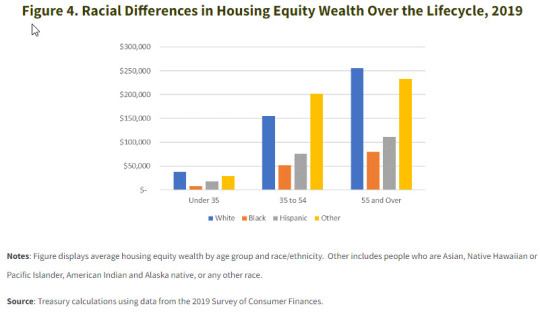
I suspect some of you may be questioning the relevance of redlining which occurred ~60 years ago. In fact, studies have confirmed the effects of redlining are still measurable today. Again from the NPR article, the study from the National Community Reinvestment Coalition, the University of Richmond and the University of Wisconsin-Milwaukee analyzed historic redlining maps from 142 urban areas across the U.S. and found "higher rates of poverty, shorter life spans and higher rates of chronic diseases including asthma, diabetes, hypertension, obesity and kidney disease."
I know I've strayed from the original question, but the reality of statistics like these are so troubling. You either have to believe that people of color don't like owning homes and accumulating wealth or the system has disadvantaged them.
I don't think this means that the government shouldn't pursue any policy that inequitably benefits a demographic which is already advantaged, but I do think it means policies should include meaningful, well-funded actions designed to actively grow the participation of the other demographics.
27 notes
·
View notes
Text
Historians and Hamilton (or a brief defense of Michael E. Newton)
There is a post out there that's something like "don't believe Michael E. Newton - he's not a historian and he's a finance bro." (I'm not deliberately vagueblogging - I just can't find the post and it's been weeks.) Now I'm not a Newton fan, and last I checked he was promoting an hour long youtube video on Alexander Hamilton's kindness (or some such nonsense), but he's conducted original research that merits review.
My concern with the post was two-fold:
That's just the old ad hominem fallacy;
2. Finance bro? - who do folks think Alexander Hamilton was?
There was a discussion on here about 1-2 years ago about who was/wasn't deserving of the title historian. "Historians" come from a variety of departments - journalism (Ron Chernow, financial journalist), English (Fawn Brodie, famous for biography of Jefferson and introduction of psychobiography), economics (Broadus Mitchell, still the gold standard Alexander Hamilton biographer) and so on. What ultimately matters is if they present their work for scholarly evaluation, and Newton does that. I have issues with some of his interpretations - though most are very limited anyway -but he's put his own or crowd-funded money towards finding and piecing together documents and put it out there for anyone to evaluate, as far as I can see (disclosure - I briefly interacted with him about a specific question about his research and he provided responses). The facts he's presented about Hamilton's early life are either right or wrong. He's also accepted by others wearing the historian hat, among them Richard Brookhiser (as the editor of National Review, maybe he's dubious, but he's certainly gotten awards and funding for history studies) and Stephen F Knott (can't really question his bona fides).
Now the great irony of Newton's discoveries about AHamilton is that they demolish the very argument that finance bros most want to make about the background of the man - that he was self-made, someone who rose up through his own merit, someone whose unfortunate background led to a lifetime of striving for the public good. Newton's AHamilton is a descendent of one of the wealthiest families in St. Croix, his mother - even post-divorce - had middle class wealth, the members of his extended family were the wealthiest people on St. Croix, he became a sort of business manager for an international shipping firm based out of NYC, he's gifted 15x the average salary of an American laborer by a relative, he arrives in the American colonies and goes to live with two of the wealthiest men in the colonies and attends schools that the wealthiest people in the colonies send their own kids to, and continues to receive opportunities through West Indian/American connections. And later, poor guy, his half-brother leaves him over 10x the average salary of an American laborer. This is not someone working their way up from the bottom, engaged in a struggle to overcome hardship and poverty. This is also not someone who is going to be personally insecure about his status. Compared to the average Anglo-American white man of that time period, heck let's even define it as the average Anglo-American middle class white man, Alexander Hamilton led a very privileged early life. But to repeat, that's not what finance bros - or those who love the Hamilton musical - want you to know about Alexander Hamilton, which makes Newton's work pretty interesting.
6 notes
·
View notes
Note
your boomer rant is a good example of not thinking about class. there are plenty of boomers suffering because of decisions other boomers in the 1% made. it isn't productive to pick fights between other members of the working class when we all have a shared enemy at the top.
If we use some reasoning, and think about the things I say and especially in my last post where I don't agree with gen wars, we will know that I do indeed think about class. But hey, since you wanted to do this on anon-
And who is voting for them to stay in power?
https://www.pewresearch.org/politics/2024/04/09/the-changing-demographic-composition-of-voters-and-party-coalitions/

And how about them poverty rates
https://www.census.gov/library/stories/2023/12/poverty-rate-varies-by-age-groups.html

They also have more homes-
"...with boomers owning 38% of homes nationwide despite comprising just over 20% of the U.S. population."
https://smdp.com/2024/02/02/baby-boomers-dominate-home-ownership-leaving-little-for-gen-z/
As of three years ago, At 43.4%, the GPI shows that Boomers hold more economic influence than Gen X, Millennials, and Gen Z combined. They make up a majority of business leaders in the U.S., and hold 42% of billionaire wealth in America.
https://www.visualcapitalist.com/ranking-u-s-generations-on-their-power-and-influence-over-society/#:~:text=In%20addition%20to%20holding%20the%20most%20Economic%20Power,instance%2C%2068%25%20of%20U.S.%20senators%20are%20Baby%20Boomers.
Here's an article about boomers by a boomer:
https://www.huffpost.com/entry/this-is-why-the-baby-boom_b_4441735
Anyways, there are just a few more reasons why we can hold older generations accountable. I'm not getting in to a "not all men" argument with you or anyone else, because the older members of our society that KNOW their generation hordes wealth and resources like dragons also know that they can vote to help society as a whole.
In any demographic there will be "good eggs" but nobody needs to white-knight the boomers
6 notes
·
View notes